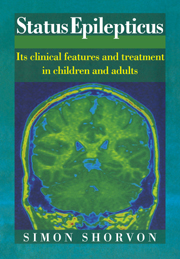Book contents
- Frontmatter
- Contents
- Preface
- 1 The concept of status epilepticus and its history
- 2 Definition, classification and frequency of status epilepticus
- 3 Clinical forms of status epilepticus
- 4 Neurophysiology, neuropathology and neurochemistry of status epilepticus
- 5 Emergency treatment of status epilepticus
- 6 Prognosis and outcome of status epilepticus
- References
- Index
- Frontmatter
- Contents
- Preface
- 1 The concept of status epilepticus and its history
- 2 Definition, classification and frequency of status epilepticus
- 3 Clinical forms of status epilepticus
- 4 Neurophysiology, neuropathology and neurochemistry of status epilepticus
- 5 Emergency treatment of status epilepticus
- 6 Prognosis and outcome of status epilepticus
- References
- Index
Summary
Status epilepticus, the maximum expression of epilepsy, has been unrightfully ignored. Amongst the 35 000 published papers in the Epilepsy Indexes, which contain almost all the scientific citations to epilepsy between 1945 and 1978, only 370 were primary or secondary references to status. The first monograph devoted to the subject (Les états de mal épileptique; Gastaut et al. 1967) was the collected proceedings of the Xth Marseilles Colloquium of 1962, a providential meeting which was a landmark in status history. The only widely known English language monograph is the proceedings of the next international conference held in 1981 (Advances in Neurology, 34: Status epilepticus: mechanisms of brain damage and treatment; Delgado-Escueta et al. 1983). In the past three decades, interest in the condition has greatly intensified, stimulated particularly by improvements in its therapy. Status has now come to be seen, correctly, not simply as an iterative version of ordinary epilepsy, but as a condition in its own right with specific clinical and experimental features. The conceptual basis of status today is very different from that defined in Marseilles in the 1960s, and substantial advances have been made in the understanding of its clinical aspects, its treatment and its scientific basis. Contemporary status epilepticus encompasses more than just the grand mal condition, although this is still its most hazardous type.
- Type
- Chapter
- Information
- Status EpilepticusIts Clinical Features and Treatment in Children and Adults, pp. xv - xviiiPublisher: Cambridge University PressPrint publication year: 1994



